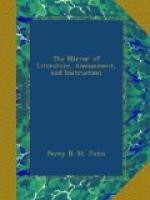* * * * *
LATE INSTRUCTION.
Socrates in his old age, learned to play upon a musical instrument. Cato, aged 80, began to learn Greek; and Plutarch, in his old age, acquired Latin. John Gelida, of Valentia, in Spain, did not begin the study of belles-lettres, until he was 40 years old.
Henry Spelman, having in his youth neglected the sciences, resumed them at the age of 50, with extraordinary success.
Fairfax, after having been the general of the parliamentary army in England, went to Oxford, and took his degree as Doctor-of-Law. Colbert, when minister, and almost 60 years of age, returned to his Latin and his law, in a situation where the neglect of one, if not both, might have been thought excusable; and Mons. Le Tellier, chancellor of France, reverted to the learning of logic that he might dispute with his grand-children.
Sir John Davies, at the age of 25, produced a poem on “The Immortality of the Soul,” and in his 62nd year, as Mr. Thomas Campbell facetiously observes, when a judge and a statesman, another on dancing.
* * * * *
THE NOVELIST.
* * * * *
ANNE OF GEIERSTEIN.
[As Sir Walter Scott’s new work has not reached us in time to enable us to fill in the outline of the story in our present Number, we give a few sketchy extracts, or portraits,—such as will increase the interest for the appearance of the Narrative.
There are some admirable specimens of Swiss scenery, which have the effect of sublime painting: witness the following attempt of two travellers, father and son, who with their guide, are bewildered in the mountains by a sudden storm. The younger attempts to scale a broken path on the side of the precipice:]
Thus estimating the extent of his danger by the measure of sound sense and reality, and supported by some degree of practice in such exercise, the brave youth went forward on his awful journey, step by step, winning his way with a caution, and fortitude, and presence of mind, which alone could have saved him from instant destruction. At length he gained a point where a projecting rock formed the angle of the precipice, so far as it had been visible to him from the platform. This, therefore, was the critical point of his undertaking; but it was also the most perilous part of it. The rock projected more than six feet forward over the torrent, which he heard raging at the depth of a hundred yards beneath, with a noise like subterranean thunder. He examined the spot with the utmost care, and was led by the existence of shrubs, grass, and even stunted trees, to believe that this rock marked the farthest extent of the slip, or slide of earth, and that, could he but round the angle of which it was the termination, he might hope to attain the




